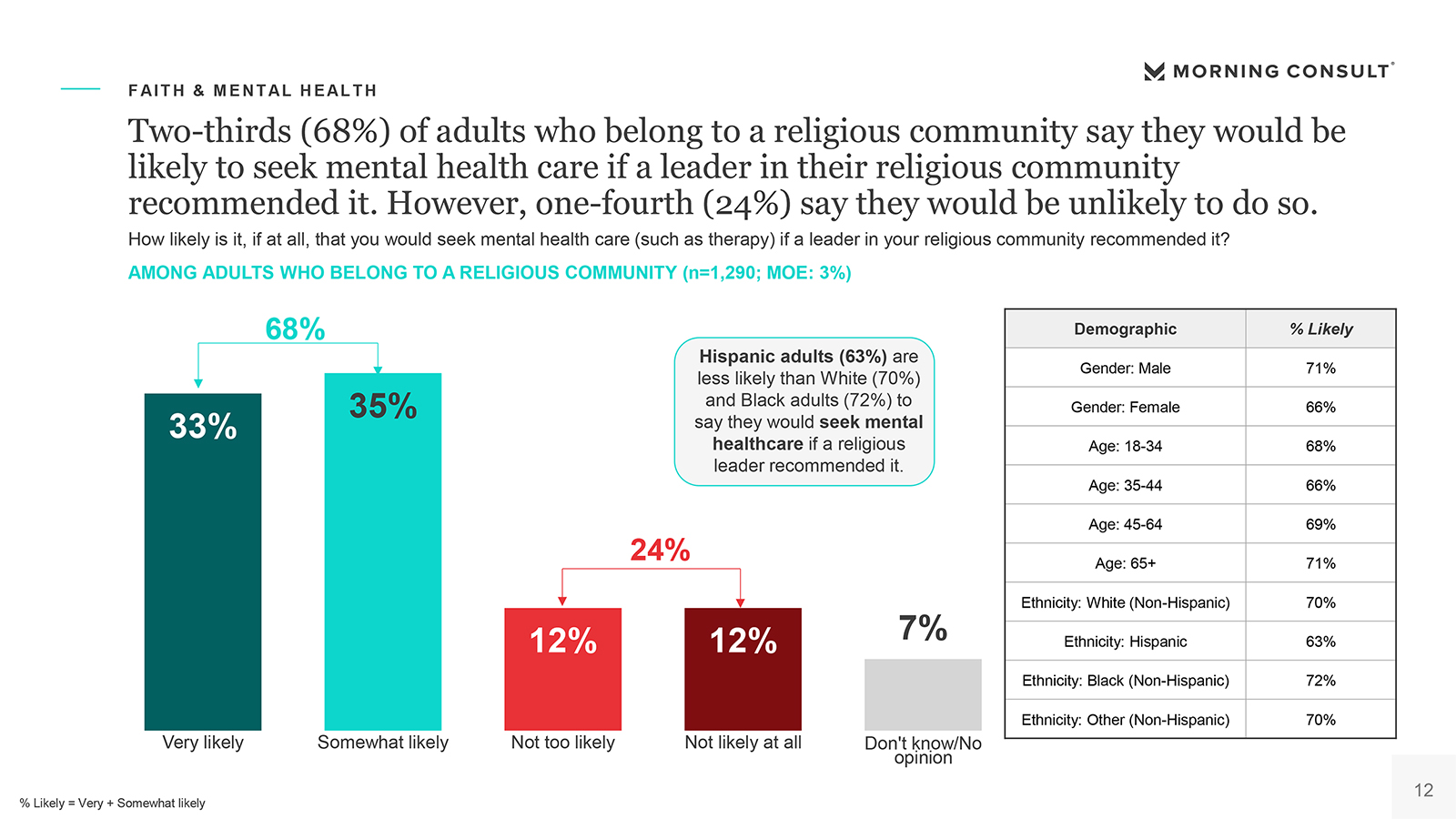The American Psychiatric Association (APA) released an important national survey that found that six in 10 adults (60%) agree that their faith or spirituality is an important factor in supporting their mental wellness, as well as their leaders of faith. While, to some, this may seem like an obvious note, it has been steadily motivating people in the Church to consider any mental health risks they have, including those in the pulpit.
Barna discovered in 2018 that 4 in 10 adults (42%) have seen a counselor at “some point” in their lives. Of that group, 13% were currently seeing someone for their mental health and 28% admitted to seeing someone in the recent past.
In 2024, things have changed and stigma about prioritizing mental health has not been a silent act in years past. Yet, among those who belong to a religious community and follow leaders of faith, just half (52%) say their religious community discusses mental health openly and without stigma, condemnation, or perceived judgment.
“Many of us rely on our faith communities for support in times of mental and emotional difficulty, whether we are struggling ourselves or we are supporting a loved one with a mental health condition,” said Marketa M. Wills, M.D., M.B.A., CEO and Medical Director of the APA. “When a faith leader supports and encourages conversations around mental health, it makes a difference to that community, and as psychiatrists, we welcome that approach.”
The survey, conducted by Morning Consult on behalf of APA, assessed the relationship between faith and mental health.
The Mental Health Movement in Faith

Praise be to the God and Father of our Lord Jesus Christ, the Father of compassion and the God of all comfort, who comforts us in all our troubles, so that we can comfort those in any trouble with the comfort we ourselves receive from God.
Compassion. Comfort. In times of trouble. The National Institutes of Health cites 57.8 million Americans live with some form of mental illness. How many more struggle with stress management? How many of those consider themselves people of faith? Managing mental health can be difficult for Christians, particularly clergy because the scriptures say we have relief in Jesus.
Last August, the Substance Abuse and Mental Health Services Administration (SAMHSA) partnered with the U.S. Department of Health and Human Services (HHS) Center for Faith-Based and Neighborhood Partnerships partnered together to determine how Christian leaders and lay people manage mental health. Their panel, named “Best Practices and Learning Collaborative for Theological Seminaries and Educational Institutions that Prepare Future Faith Leaders found some revealing numbers:
- 18% of clergy report discussing mental health concerns with congregants at least once a month
- 25% of Christians who need mental health treatment turn to their faith leaders for support in lieu of clinical support.
- 73% of all clergy report being approached at least once in the last year for help with mental illness.
Comparing pastors and other clergy fulfilling their roles versus anyone else fulfilling theirs, the panel discovered the heightened sense of stress attacking people in the Church.
- Faith leaders enter their positions having experienced higher rates of household mental illness (36% vs. 25%)
- Higher rates of emotional abuse (53% vs. 39%)
- Close to 50% of all faith leaders leave the profession within 5 years
- Nearly 65% percent of faith leaders are either on the verge of burnout or already burnt out.
It seems Christ-followers would better accept and manage their mental health issues if their pastors admitted they needed help as well. The statistics in the APA poll underscore how people in the pews follow the counsel of the pastors in the pulpit. However, pastors should look at themselves in the mirror and admit they need counsel. If they did, it could be a blessing to their followers.

“The results from this APA poll underscore the trust congregants place in faith leaders to give advice and counsel, and to know when additional mental health support is necessary,” said Rawle Andrews Jr., Esq., the executive director of the APA Foundation. “By giving faith leaders the resources they need to make these connections to care, and in turn giving psychiatrists the CME training they need to provide culturally competent care, we are creating more equitable mental health outcomes for patients and their families.”


